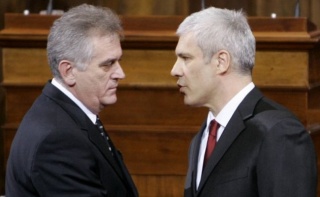Marketing
Does the new president of Serbia hamper the Western Balkans regional stability?
On May 31, 2012 Tomislav Nikolić was sworn in for a five-year term at an inaugural session of Serbia's new parliament. On June 11, the new president of Serbia will be inaugurated in Belgrade. Unlike to many recent inauguration ceremonies, it seems that regional political establishment will obstruct this one. The reason for such a decision lies in inflammatory and intolerant wording of the newly elected president, which might endanger fragile inter-regional stability and cooperation.
A new President's political biography
Tomislav Nikolić, president of a reformed ultra-nationalist Serbian Progressive Party, won the Serbian presidency second run-off on May 20, 2012. His victory came as a surprise, since majority of political analysts expected a secure victory of a former president Boris Tadić. Until Tadić's defeat, Serbia has been steadily securing European political future. Is this questionable in the future?
Nikolić run four times for the presidency of Serbia since 2000, three times narrowly losing presidential votes. Although Tadić's pro-Western policies resulted in Serbia's EU candidate status his fail is likely linked to voters' discontent with weak economy and corruption within the ruling elite. In addition, Tadić was criticized for not willing to give up his party political leader position, in this way controlling the weak Prime Minister from his Democratic Party. On the other hand, Nikolić's populist platform promised jobs, fight against poverty and corruption. And, immediately after his election as Serbia's new president he formally resigned as the Serbian Progressive Party leader.
Nikolić's political life in the shortest version can be described as chameleonic. Early the 1990s Nikolić joined the ultra-nationalist and nowadays war crime suspect Vojislav Šešelj. Nikolić helped him form the Serbian Chetnik Movement , an ultranationalist group that later merged into the Serbian Radical Party. It is documented that back in early 1990s Nikolić fought as a military volunteer in Croatia together with Šešelj's paramilitary forces. Nikolić and his party were former allies of wartime Serbian leader Milošević. After the Serbian Radical Party formed a coalition with Milošević’s Socialist Party of Serbia in March 1998 Nikolić served as the Deputy Prime Minister of Serbia from and then of FR Yugoslavia. After the Radical Party leader Šešelj voluntarily surrender to the International Criminal Tribunal for the former Yugoslavia in 2003, Nikolić became the deputy leader of the party. Nikolić then insisted in changing party programme from rigidly militant nationalist to one focusing on economic and social issues. In an opportunist manner, Nikolić gave up in 2008 his former political mentor Šešelj, declaing his support for Serbian future within the EU. After splitting with Šešelj, Nikolić then formed the Serbian Progressive Party followed by several Serbian Radical Party MPs. Not that long time ago, in 2007, as the Speaker of Parliament he envisaged Serbia as a Russian province that would be able to "stand up against the hegemony of America and the European Union”. Explaining why Nikolić won and what it might mean for the region Florian Bieber assesses Nikolić's break with his own radical past as „pragmatic, not substantial“.

(c) dnevnik.ba
Adding to the political turmoil in the Balkans
In advance to the elections and shortly after it, Nikolić managed to stir the good neighbourly relations of Serbia and countreis of the region. First, in an interview to the German daily Frankfurter Allgemeine Zeitung he declared that Vukovar was a Serb town and that the Croatians have nothing to do there. To recall, Vukovar is a city in Croatian a border region with Serbia that was fully demolished in 1991 by the Serb paramilitary and Yugoslav army artillery. Such a statement caused a great disappointment and public disapproval in Croatia, making Croatian president Ivo Josipović decide not to attend the inauguration.
Just some days after its elections Nikolić stated that the July 1995 massacre of 8.000 Bosnian Muslim men and boys in the Eastern Bosnian town of Srebrenica was not genocide but the killings amounted to grave war crimes. In that city massive slaughtering of male population took place in a matter of days following outburst of the Serb troops over the UN-protected enclave causing the gravest atrocity in Europe since World War II. The genocidal nature of this terrible event had been confirmed by both the International Criminal Tribunal for the former Yugoslavia (ICTY) and the International Court of Justice. European Commission reacted immediately , declaring it would not tolerate attempts to negate the genocide of Muslims at Srebrenica and strongly rejecting any intention to rewrite history. Acting Chairman of the Presidency of Bosnia and Herzegovina Bakir Izetbegović announced that he will not attend the inauguration.
The newly-elected Serbian president also contested Montenegrin identity in recent days, saying he does recognise Montenegro as an independent country but does not recognise any difference between the Serbs and the Montenegrins. He furthermore expressed his wish to see Serbia and Montenegro develop much better relations in the future than they have done so far because the Serbs and the Montenegrins have much in common. Montenegrin President Filip Vujanović confirmed his intention to attend the Serbian president inauguration.
Finally, this week Nikolić told he would never and under no circumstances recognise Kosovo's independence, even at the cost of cessation of Serbia's EU integration. Needless to say, of course, the President of Kosovo Atifete Jahjaga has not been invited to the inauguration party. Namely, the most troublesome relation Serbia has with neighbouring Kosovo, which declared independence in 2008. Serbian government has refused to recognize independence of its former province since that territory is considered the cradle of Serbia's state and religion. Although Nikolić declared that so far nobody had raised the issue of Belgrade's recognition of Kosovo as a precondition for Serbia's progress in its integration with the European Union, this issue is going to be placed on the negotiations table sooner or later. Unresolved Cypriot question is the ultimate motivator for the EU policy makers to handle the Kosovo issue in advance to Serbia's and Kosovo's accession. Tadić on the other hand fostered conciliatory stance toward neighbourhood that at large experienced aggression to their territories from Serbia throughout 1990s. By doing so he pleased the European Union that made development of good neighbourly relations as a part of pre-accession criteria for the Western Balkans countries.

(c) dnevno.hr
Although Nikolić's public gaffes obviously endanger Serbia's initiated efforts to reconcile with its neighbours, it is unlikely Nikolić as president can significantly slow down Serbia's the European Union accession process. The Serbian president has only limited constitutional authority. The economy and foreign policy are managed by the government. Serbia has been officially a candidate since March this year and the majority of pre-accession work is to be done by the government that will very likely be presided by the former President Tadić. It will be a tough job for Tadić, to a great extent due to the fact that his future coalitional government joints political parties from across the ideological spectre. For example, the Socialist Party of Serbia, the likely minor coalitional partner in the future government, is demanding that the state should start spending money rather than saving it. The third partner in the coalition will very likely be the pro-European Liberal Democratic Party is openly advocating secession of Kosovo. Although the Progressive Party members warn that the new government led by Tadić will lack legitimacy , since the Nikolić’s Progressive Party indeed won the relative majority in May 6 parliamentary elections, Tadić will do his best and utmost to form the government and earn the majority in votes in the Parliament. Namely, an attempt of a cabinet composing for the Democratic Party’s leader Tadić is now a question of political survival that would keep the pro-European image of Serbia.
Post je objavljen 08.06.2012. u 23:26 sati.